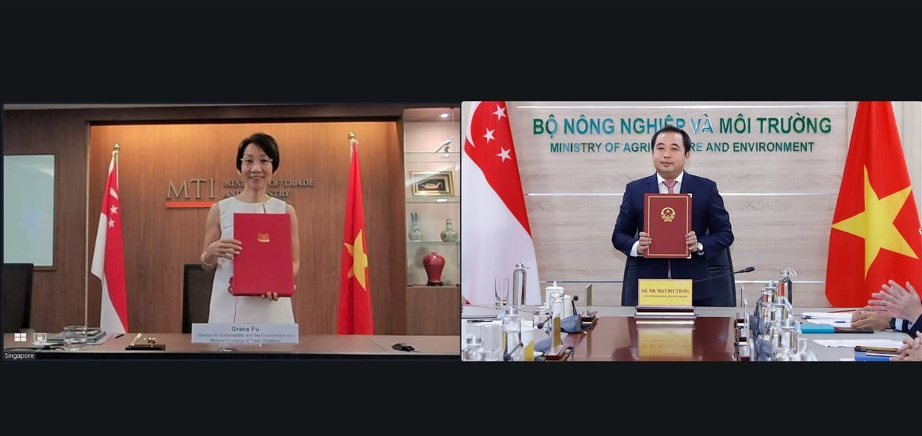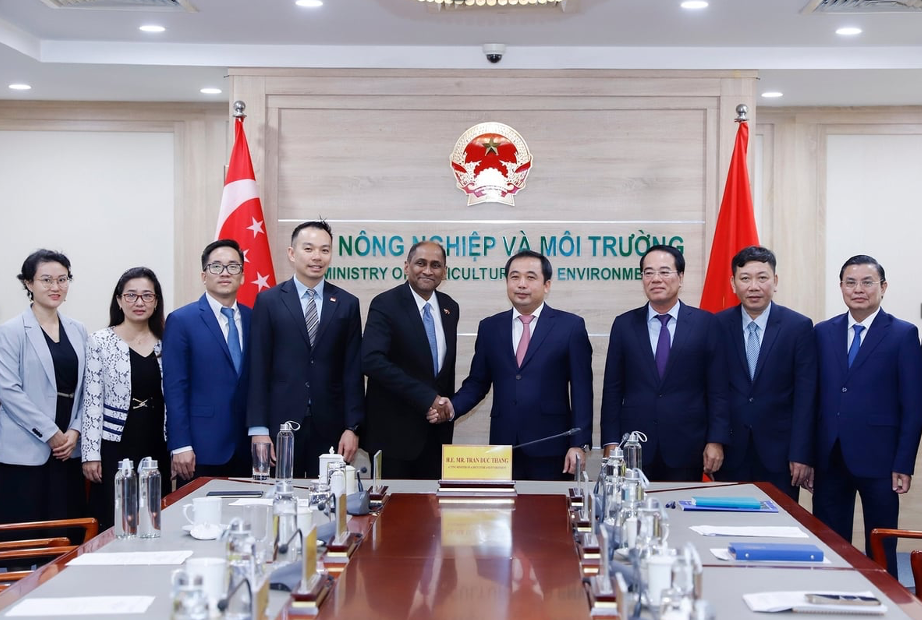In a significant step forward for regional climate cooperation, Vietnam and Singapore today signed a landmark agreement to implement a framework under Article 6 of the Paris Agreement.
The deal, a first of its kind for Vietnam, will enable the creation and transfer of high-quality carbon credits, opening new avenues for climate finance and investment in sustainable development.
The agreement was signed virtually by Vietnam's Acting Minister of Agriculture and Environment, Tran Duc Thang, and Singapore's Minister for Sustainability and the Environment and Minister-in-charge of Trade Relations, Grace Fu.
The signing reinforces the pioneering roles and strong commitment of both Vietnam and Singapore to international carbon market cooperation, making a tangible contribution to global efforts in combating climate change.
 The agreement was signed virtually by Vietnam's Acting Minister of Agriculture and Environment Tran Duc Thang, and Singapore's Minister for Sustainability and the Environment Grace Fu.
The agreement was signed virtually by Vietnam's Acting Minister of Agriculture and Environment Tran Duc Thang, and Singapore's Minister for Sustainability and the Environment Grace Fu.This establishes a legally binding bilateral framework, enabling Vietnamese organizations and businesses to develop greenhouse gas (GHG) emission reduction projects. These projects can generate carbon credits that meet international standards and can be recognized and transferred to Singapore.
The Ministry of Agriculture and Environment stated that detailed information on the approval process for carbon credit projects and the list of eligible methodologies will be released in the near future.
Acting Minister Thang emphasized that this bilateral legal framework provides the foundation for Vietnamese organizations and businesses to register GHG emission reduction projects and generate carbon credits, with the results recognized and transferred to Singapore.
"This is a turning point that opens up new climate financing, encourages investment in advanced technology, reduces emissions, promotes clean energy transition, fosters sustainable smart agriculture, and moves toward a circular economy", Acting Minister Thang said.
He expressed his hope that Singaporean enterprises will actively cooperate and invest in projects in Vietnam to create high-quality carbon credits. This collaboration, he noted, will help shape a regional carbon market where both Vietnam and Singapore play a leading and connecting role.
Speaking at the signing ceremony, Acting Minister Thang reiterated, "Today's agreement marks a significant step forward in climate cooperation between our two nations, affirming Vietnam and Singapore's role and responsibility in promoting the exchange of greenhouse gas emission reduction outcomes and carbon credits”.
"The agreement serves as a legal basis for Vietnamese businesses to register emission reduction projects and generate carbon credits, unlocking new climate finance sources, encouraging investment in advanced technology, and fostering sustainable agriculture and a circular economy", he added.
 Singapore's Ambassador to Vietnam, Jaya Ratnam, congratulates Acting Minister Thang during the signing ceremony on the morning of September 16.
Singapore's Ambassador to Vietnam, Jaya Ratnam, congratulates Acting Minister Thang during the signing ceremony on the morning of September 16.Singapore's Minister for Sustainability and the Environment Grace Fu noted that 2025 is a particularly significant year for both countries: Vietnam celebrates the 80th anniversary of the People's Army, the 50th anniversary of national reunification, and 30 years since joining ASEAN, while Singapore commemorates its 60th year of independence.
Minister Fu highlighted Vietnam as one of Singapore's most important economic partners. In 2024, Vietnam ranked 11th among Singapore's largest trading partners, while Singapore remained the largest foreign investor in Vietnam.
According to the minister, technical teams from both sides have worked persistently for several years to reach this agreement. She expressed confidence that its implementation will boost climate cooperation and strengthen green investment connections, positioning Vietnam and Singapore as pioneers in ASEAN's international carbon credit exchange mechanism.
Today's cooperation between Vietnam and Singapore is expected to promote GHG emission reduction activities and attract international capital to Vietnam. This will bring practical benefits to local communities, such as creating jobs and improving access to clean water, while also helping Vietnam enhance its energy security, reduce environmental pollution, and achieve sustainable development.